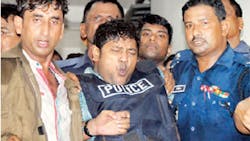Owner of Collapsed Bangladesh Factory Faces Murder Charges
DHAKA -- Bangladesh police said Tuesday they will press murder charges against the owner of a nine-storey building that collapsed and killed 1,135 garment workers last April, the worst industrial disaster in the country's history.
Sohel Rana, owner of the Rana Plaza factory complex on the outskirts of the capital Dhaka, was one of around 40 people who would be charged in connection with the disaster, said lead investigator Bijoy Krishna Kar.
"We are planning to press murder charges against Sohel Rana and some other accused," Kar of the police's Criminal Investigation Department said, adding that if convicted Rana could be sentenced to death.
It was the first time police have said they would file murder charges against Rana, who was arrested on the western border with India as he tried to flee the country days after the April 24 disaster.
Rana, a junior official in the ruling Awami League party, became the country's public enemy number one after survivors recounted how thousands of them were forced to enter the compound at the start of the working day despite complaints about cracks appearing in the walls.
Among the others expected to be charged are Rana's father, who is a co-owner of the building, and five bosses of the garment factories operating within the complex who also allegedly ignored the cracks.
The five include David Mayor, a Spanish citizen who was out of the country at the time of the collapse, said Habibur Rahman, another CID investigator.
Most of the accused are out on bail while Mayor never returned to the country to avoid arrest.
A host of Western retailers had clothing made at Rana Plaza, including Italy's Benetton, Spain's Mango and the British low-cost chain Primark.
Investigation Almost Over
"Our investigation is almost over. We wanted to wrap up our work before the first anniversary of the tragedy on April 24 but even writing up the case notes has proved to be a huge task," Rahman said. "We hope we can press the charges by next month."
The collapse was the worst industrial disaster in Bangladesh's history.
It prompted sweeping reforms including tough new factory construction guidelines to stave off another disaster in the $22 billion industry, the world's second largest after China.
CID officials said Bangladeshi engineers, regulators who approved the building without inspecting the site and some mid-level factory managers would also be charged for their roles in the disaster.
Kar said police investigators have questioned 900-1,000 people including the survivors, witnesses and found "irrefutable evidences" against the "greedy and irresponsible" building and factory owners.
Bangladesh is home to around 4,500 garment factories which employ around four million workers -- some 80 percent of them are women -- who are paid some of the lowest wages on earth.
But the sector has a woeful safety track record, highlighted by the collapse of the Rana Plaza compound and a fire at Tazreen Fashion factory that killed 111 people six months earlier.
Western retailers, the main buyers of Bangladeshi apparel, formed two umbrella groups late last year to push through crucial safety reforms in the industry.
Engineers hired by the retailers have since shut down at least 11 factories temporarily and ordered scores of other factories to improve fire and building safety in an effort to avoid a repeat of the disaster.
-Shafiqul Alam, AFP
Copyright Agence France-Presse, 2014
About the Author
Agence France-Presse
Copyright Agence France-Presse, 2002-2025. AFP text, photos, graphics and logos shall not be reproduced, published, broadcast, rewritten for broadcast or publication or redistributed directly or indirectly in any medium. AFP shall not be held liable for any delays, inaccuracies, errors or omissions in any AFP content, or for any actions taken in consequence.
